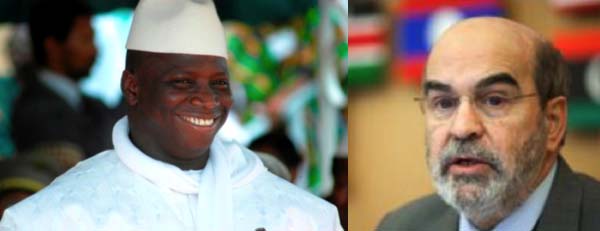
The Vice President and Minister for Women’s Affairs, Isatou Njie-Saidy, led The Gambia’s delegation to receive the award on behalf of President Jammeh, according to news aired on GRTS on Wednesday.
It stated that the Director General of FAO, Dr Jose Graziano Silva, commended The Gambia for its significant progress and political will, which has reduced hunger to 6 per cent from more than 13 per cent two decades ago.
The 13 countries around the world last week gathered in Rome, Italy, to receive an award from the Director General of UN FAO “for their outstanding achievements in reducing hunger and undernourishment.”
That was what the FAO called extra-ordinary economic challenges, and these countries from Africa were recognised for their strong political will that has led to significant progress in hunger reduction.
The Gambia and the other 12 recipients were commended by the FAO boss for demonstrating the will and mobilising the necessary resources to reduce hunger, thus meeting the MGD’s 1C target.
According to the FAO, hunger is more prevalent in sub-Saharan Africa with one person in four hungry.
Therefore, The Gambia’s achievement in reducing hunger from 13 to 6 per cent is in line with the 2015 target to reach the World Food Summit goal.
The focus now, according to the FAO DG, is to look into the future as food security, hunger and nutrition will feature prominently in the post-2015 sustainable development goals.
The Vice President, Isatou Njie-Saidy, attributed “Gambia’s outstanding achievement to the visionary leadership of President Jammeh, as food security is his government’s top priority.”
She noted that over the last 20 years, President Jammeh has been sensitizing the Gambian population through various pronouncements, ranging from the back-to-the-land, to Operation Feed Yourself, Operation Feed the Nation, and grow what you eat and eat what you grow.
“We have Vision 2016. By the end of 2015 this year towards 2016, we should be self-sufficient at least in the basic staple food, rice,” she declared.
The President’s personal involvement in agriculture has led to a significant increase in crop and livestock production, culminating in the reduction of hunger and malnourishment among the population, particularly women and children in the rural areas, she went on.
The challenge now for The Gambia and the other 12 recipients is to sustain this gain, while at the same time working hard to eradicate hunger.
The Minister of Agriculture, Solomon Owens, said from 1992 to 2014 hunger was reduced from 13 to 6 per cent.
Read Other Articles In Article (Archive)



